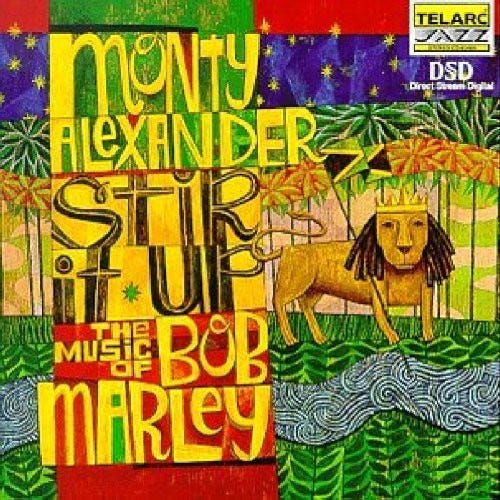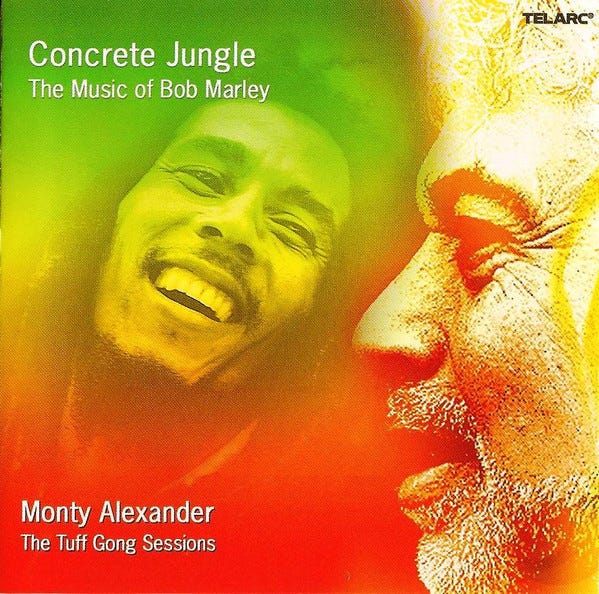Bonus: "Marley's Ghost"
Additional Thoughts on the Great Singer-Songwriter & Defacto Civil Rights Leader
The Story So Far:
My feature essay in The Wall Street Journal, on the occasion of what would have been the 75th birthday of Bob Marley, February 4, 2020.
From today’s New York Sun (February 19, 2024), my review of the new biopic, Bob Marley: One Love.
On February 6, 2020, I was waiting for the bus on Frederick Douglass Boulevard, coming home from the Blink gym on 125th Street, when I heard an unfamiliar voice singing a very familiar song: “Old pirates, yes, they rob I, sold I to the merchant ships / Minutes after they took I, from the bottomless pit…” I turned around, and there was a young African American man - at least, considerably younger than I - and I joined him in the next line: “But my hand was made strong by the hand of the Almighty” and as we boarded the bus, we continued together in rather rough spontaneous harmony, “We forward in this generation, triumphantly.” At the end of the song, I asked him, “Do you realize that today would have been the 75th birthday of Bob Marley?” He hadn’t, and he thanked me for letting him know. (He made no mention of my singing.)
Marley’s music had that kind of power, the ability to unite two strangers, people from entirely different backgrounds, and bring us together in our shared humanity.
It’s no secret that Bob Marley is one of my all-time favorite songwriters - especially amongst those outside of the genres that I more typically write about - along with Hank Williams, Bob Dylan, Jimmy Webb, and not that many others. Four years ago, I had the pleasure and privilege of writing a 75th-birthday story on Marley for the Wall Street Journal, and this weekend I was fortunate to be asked to write the review of the new biopic produced by his son Ziggy Marley, Bob Marley: One Love for the New York Sun. (I’ll link to both stories.)
As a supplement to both, I thought I’d share a couple of footnotes and not-so-deep cuts related to the love of Marley.
Marley made no secret of how he occasionally based some of his compositions on existing songs. In One Love, we see how Ernest Gold’s movie theme from the 1960 Otto Preminger epic Exodus became the inspiration for one of Marley’s best-known songs and albums. As is well known, the original “Theme from Exodus,” was, from the beginning, extremely popular in the African American community - the jazz version by saxophonist Eddie Harris was one of the major instrumental hits of the era. My favorite version with the lyrics (credited to Pat Boone, surprise, surprise) is by Billy Eckstine from this 1962 Mercury album Don’t Worry ‘Bout Me.
Marley performed several slightly different arrangements of his own song, “Exodus,” changing it according to whatever musicians he had with him. On this concert from Santa Barbara, California, in 1979, he has a small horn section, and they play a countermelody that begins with a two-note theme that was obviously inspired by Gold’s theme.
On the same album, the 1977 Exodus, Marley also introduced what might be his single best known song, “One Love.” Here, he was even more open in his borrowing - even “sampling” - from a previously existing work. “People Get Ready” was a 1965 hit by Curtis Mayfield and The Impressions, and you can see how it would have exerted a powerful influence on the young Bob Marley: it’s considered part of the secular “soul music” genre, but is also a gospel song, and it contains a message of civil rights and social justice:
CURTIS MAYFIELD / People Get Ready / Live In Montreux 1987 True Legend
Bob Marley acknowledged Mayfield’s composition in that the track itself, as it appears on the Exodus album, as well as the new One Love soundtrack album, is labeled “One Love / People Get Ready.” Surprisingly ,video performances of the song by Marley himself are disappointingly rare - he doesn’t seem to have performed it on any of the concerts that were filmed. But there is this audio from the 1978 One Love Peace Concert, where he famously united the leaders of the two warring political parties. (This scene, incidentally, is the climax of the current film.) Famously, he quotes Mayfield’s line: “Is there a place for the hopeless sinner / Who has hurt all mankind just to save his own?”
The following are just a handful of my favorite interpretations of Bob Marley songs - anybody other than myself would probably call them “covers.” The first is hardly a surprise: Eric Clapton’s version of “I Shot the Sheriff” which - as a number one hit in the United States in 1974 - served to open the door for Marley’s own imminent international stardom, and didn’t hurt Clapton’s career either. Here’s Clapton and company on the great British music series, The Old Grey Whistle Test. The other version posted below is that formidable cabaret entertainer, Marge Simpson. (Of course, it’s subtitled in Italian - in case anybody wants to sing along in Reggae Italiano)
Eric Clapton on The Old Grey Whistle Test
Marge Simpson
Joe Strummer (who looks suspiciously like André Previn in the photo below) of the Clash did one of the more famous versions of Marley’s “Redemption Song,” in which Marley borrowed some of his text not from Curtis Mayfield but from Marcus Garvey. (“We are going to emancipate ourselves from mental slavery because whilst others might free the body, none but ourselves can free the mind.”) The performance by Strummer and The Mescaleros is excellent, but even better is the track in which Strummer accompanies the greatest of the great, the legendary Johnny Cash. You can tell in his voice that here is a man who’s been robbed by more than his share of pirates (not to mention rabbis). (Actually, Strummer looks like André Previn trying to audition for the role of “Bernardo” in West Side Story.)
Johnny Cash & Joe Strummer - Redemption Song
Confession: I’m not all that familiar with the output of Lauryn Hill, but I really dig this interpretation of Marley’s “Could You Be Loved?” (From The Jimmy Fallon Show, May 12, 2011 - almost 30 years to the day after Marley’s death.)
This is very special and unique: the brilliant contemporary jazz singer Dianne Reeves sang “Waiting in Vain” on her 2013 album Beautiful Life. The commercially-released studio version is lovely, but very “produced.” I much prefer this live version from Jazzwoche Burghausen (that’s Germany, you all). She’s said that she wanted to perform it in a straight-ahead jazz fashion, without any hint of reggae. This is a singularly great concert by a singularly great artist. (The whole concert is terrific, but the link below takes you directly to the song, so you don’t have to wait in vain.)
And a very special shout-out to the jazz musician who has done more than any other to bring Marley’s music into Birdland and Jazz at Lincoln Center, not to mention jazz clubs and concert halls all over the world. Monty Alexander was born in Kingston, Jamaica, all of eight months before Robert Nesta Marley arrived on the same island in Nine Mile, St. Ann Parish. As a young pianist, Monty played on many early ska and mento recording sessions; then he left for the United States just around the time that Marley was forming the original edition of the Wailing Wailers, and their paths never crossed. Still, Monty has been Marley’s champion - another kind of rabbi - for decades, and has opened many pairs of ears, including mine, to the beauty and majesty of Marley’s music.


Below is a live performance of one of Marley’s signature love songs, “No Woman, No Cry.” (Hassan Shakur, son of the brilliant pianist Gerry Wiggins, is on bass, and Obed Calvaire, a young drummer of Haitian heritage, completes the trio. He’s currently with the Jazz at Lincoln Center Orchestra, and just put together a wonderful centennial concert for the legendary Max Roach.) I highly recommend both of the two Marley song books that Monty has released, they’re both among my all-time favorite albums: Stir it Up (1999) and Concrete Jungle (2006).
Very Special thanks to the fabulous Ms. Elizabeth Zimmer, for expert proofreading of this page, and scanning for typos, mistakes, and other assorted boo-boos!
Sing! Sing! Sing! : My tagline is, “Celebrating the great jazz - and jazz-adjacent - singers, as well as the composers, lyricists, arrangers, soloists, and sidemen, who help to make them great.”
A production of KSDS heard Saturdays at 10:00 AM Pacific; 1:00PM Eastern.
To listen to KSDS via the internet (current and recent shows are available for streaming.) click here.
The whole series is also listenable on Podbean.com, click here.
Saturday, February 24
10:00AM Pacific Time / 1:00PM Eastern Time
KSDS San Diego Presents
BLACK HISTORY MONTH: NAT KING COLE plays and sings
THE GEORGE & IRA GERSHWIN SONGBOOK
for more info and streaming link, click here
SLOUCHING TOWARDS BIRDLAND is a subStack newsletter by Will Friedwald. The best way to support my work is with a paid subscription, for which I am asking either $5 a month or $50 per year. Thank you for considering. (Thanks as always to Beth Naji & Arlen Schumer for special graphics.) Word up, peace out, go forth and sin no more! (And always remember: “A man is born, but he’s no good no how, without a song.”)
Note to friends: a lot of you respond to my SubStack posts here directly to me via eMail. It’s actually a lot more beneficial to me if you go to the SubStack web page and put your responses down as a “comment.” This helps me “drive traffic” and all that other social media stuff. If you look a tiny bit down from this text, you will see three buttons, one of which is “comment.” Just hit that one, hey. Thanks!








Love this.
nice one Will! bb